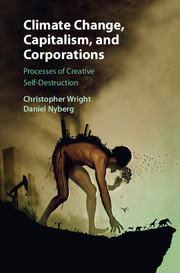Book contents
- Frontmatter
- Dedication
- Contents
- List of figures
- List of tables
- Foreword
- Acknowledgements
- 1 Climate change and corporate capitalism
- 2 Creative self-destruction and the incorporation of critique
- 3 Climate change and the corporate construction of risk
- 4 Corporate political activity and climate coalitions
- 5 Justification, compromise, and corruption
- 6 Climate change, managerial identity, and narrating the self
- 7 Emotions, corporate environmentalism, and climate change
- 8 Political myths and pathways forward
- 9 Imagining alternatives
- Appendix
- References
- Index
- References
References
Published online by Cambridge University Press: 05 October 2015
- Frontmatter
- Dedication
- Contents
- List of figures
- List of tables
- Foreword
- Acknowledgements
- 1 Climate change and corporate capitalism
- 2 Creative self-destruction and the incorporation of critique
- 3 Climate change and the corporate construction of risk
- 4 Corporate political activity and climate coalitions
- 5 Justification, compromise, and corruption
- 6 Climate change, managerial identity, and narrating the self
- 7 Emotions, corporate environmentalism, and climate change
- 8 Political myths and pathways forward
- 9 Imagining alternatives
- Appendix
- References
- Index
- References
- Type
- Chapter
- Information
- Climate Change, Capitalism, and CorporationsProcesses of Creative Self-Destruction, pp. 207 - 242Publisher: Cambridge University PressPrint publication year: 2015



